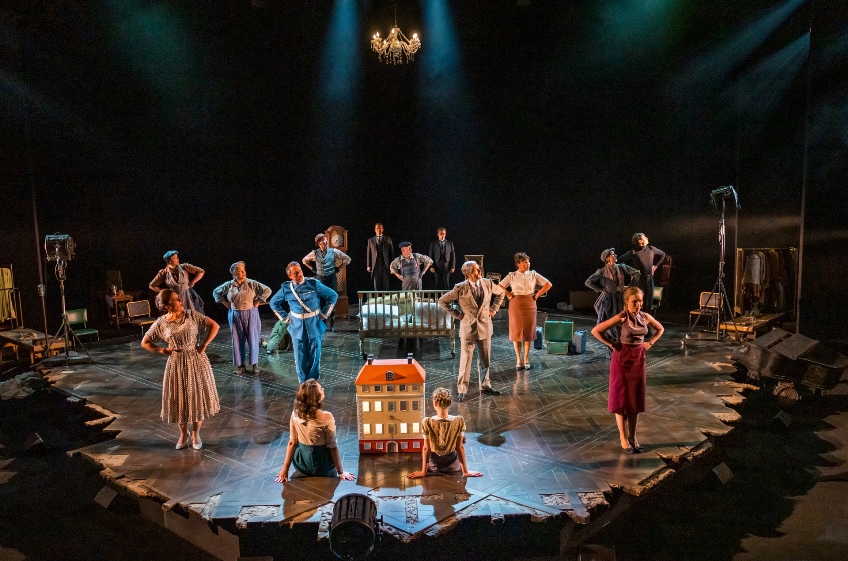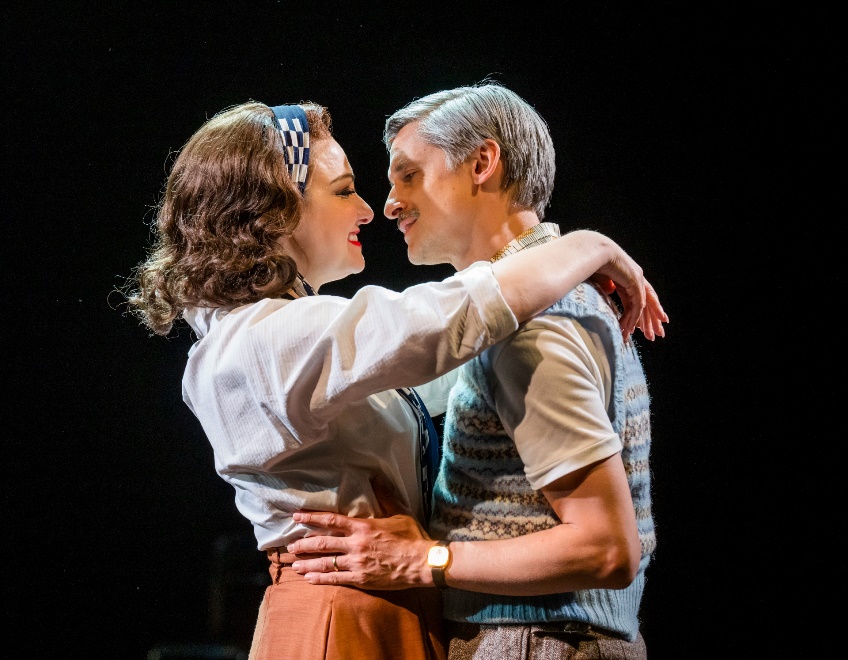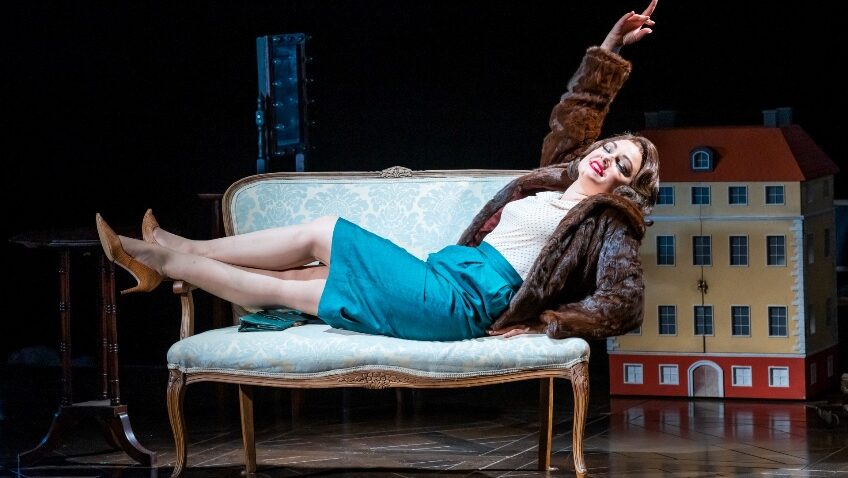July 6th 2022
Bravo and a wopping great wow-issimo! Coupling Leeds Playhouse with Opera North is a marriage made in Heaven, all the more divine for having Sondheim’s original, spellbinding orchestration played to phenomenal perfection, live onstage, by The Orchestra of Opera North. While the comic story of improbable marriages, relationships and complex love triangles is far from heavenly, and the bizarre situations and characters often verge on bonkers, the quality of the acting, singing and playing of every single performer is so superb that the incredible, even the ridiculous, becomes real enough to engross, involve and move the audience at every turn.
Sondheim’s musical, with book by Hugh Wheeler, was staged on Broadway in 1973 and inspired by Ingmar Bergman’s film of 1955 Smiles of A Summer Night. Full of intertwined love affairs, deceptions, longings, regrets and nostalgia, the romantic farce is set in the privileged society of early twentieth century Sweden (though this production moves it on a few vague decades.) The roles, attitudes, needs and aspirations of men and women as regards marriage and amorous liaisons, both marital and extra-marital, are what propel the turmoil and prompt all the physical and emotional goings-on, with everyone’s thoughts, dreams and fears being revealed and developed in dramatic, music-free scenes and also in wonderfully integrated songs.
Clad in burnished gold, Dame Josephine Barstow, all ancient, stately elegance and magnificent diction, is a commanding presence as Madame Armfeldt, seated in her plush Bath chair. A lady who’s not for turning, she delivers reprimands and pearls of worldly, world-weary wisdom with dry, caustic wit, revelling, though not without regret, in the memory of her glorious past, when amorous liaisons with those in high places were exceedingly discreet and brought great material reward. Of a more modern era, her daughter Desiree is a working actress, far from discreet in her amorous affairs. Mezzo-soprano Sandra Piques Eddy creates a beautifully warm, sympathetic Desiree, while Lucy Sherman as her school-aged daughter, Fredrika is also warm and amiable.

Meanwhile, Desiree’s ex-lover, lawyer Fredrik Egerman, played by baritone Quirijin de Langwith with a grey-haired straightness, tinged with comic spark, has married 18-year-old Anne. Bright soprano Corinne Cowling bubbles and bounces as the naive girl, who, after 11 months of marriage, still hasn’t plucked up the courage to conjugate with her husband. More her own age is stepson, Henrik. Clad in black, repressed, depressed, priggish and gauche, Sam Marston hits the spot with his exciting tenor tones and awkward body language, bringing out Henrik’s mardy humour as the seminary student grows ever more frustrated both personally and amorously, even after maid Petra, worldly, joyous, down-to-earth, offers him her special help. In spite of her own dreams, Petra is lower class so resigned to ultimately ending up with The Miller’s Son, and Amy J Payne’s poignant song about it earns great applause. She, like every other character, adds a charm of her own, and the comedy is never overblown. Even the strutting soldier Count, big fan of duels and Russian Roulette, and his Countess wife, who are a particularly ludicrous pair, are brought well and truly to life and likeability by praiseworthy mezzo Helen Evora and fine baritone Christopher Nairne.
According to Madame Armfeldt the summer night smiles on three types – the young, the old, and the fools (and thus Desiree sings Send in the Clowns). All are in the mix, and the smiles do eventually come – though it’s tears and twisting torment along the way.
Glorious throughout is the music, always serving drama, mood and emotion and never overpowering it. Deliciously smooth, mellow blends of instruments, incorporating irresistible, gliding dance rhythms, give way to magical passages for harp, celeste, oboe, bassoon, timpani, strings, flute and the rest, as new, exciting textures and melodies take turns to delight.

Likewise fabulously integrated into the drama and emotions of the piece, as well as into prop-shifting, is a fine chorus of five ubiquitous characters. Like all the cast, these sport a whole range of interesting items of attire to evoke the period, amongst which – bowler hat, boater, braces, corsets, waistcoat, petticoat, pullover, cravat and a knotted hankie on the head. Their fabulous singing voices and vibrant songs, sung separately or together, play a huge part both in relating the thoughts and goings-on in the lives of the main characters and also in making the entire musical pleasingly rounded. Main character duets and trios, too, like Now/Soon/Later and ensemble numbers like the big Act one finale A Weekend In The Country are particularly pleasing, this one leaving everyone humming the tune at the interval and keen for more.
Like her costumes, Madeleine Boyd’s set, too, has a sparkle of its own – and not just from the chandelier hoisted into place at the outset. On the patterned wood flooring of a thrust stage that’s been massively and irregularly gnawed away by giant rodents all around its edge, sit simple oases of evocative, easily moved props, lit for separate scenes – a big old bedstead, make-up mirror, desk, period chairs, old painting, grandfather clock, tilted piano, Fredrika’s tall doll’s house, and for the play within the play a sumptuous, red velvet curtain descends. Act II creates an equally versatile space: a sunken garden with circular perimeter, piles of sunken gravel, a marble fountain, a hideous, spouting Cupid and some properly wet water.
Here we have a story based around attitudes of bygone eras, absurd in places even for a comedy, but the all-round excellence of dramatic interactions, the music, singing and live orchestra make this something very special indeed, something so delightfully charming and amusing, so engaging and moving, that we can buy into it wholeheartedly.
Eileen Caiger Gray
The production continues until July 16th.




